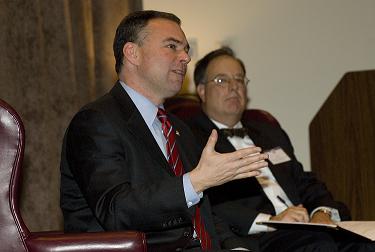|
|

| March 2007 Virginia Gov. Timothy M. Kaine Shares Leadership Insights, Challenges Virginia Gov. Timothy M. Kaine has a very simple leadership philosophy. “Success in large institutions is a function of two things: goals and relationships," he told an audience of students, faculty and community members in Jepson Hall last November. "Goal setting is where it begins, but relationships are how you get there.” Kaine, who assumed office in January 2006, said he has identified four primary goals for his administration: crafting solutions to the state’s transportation woes; providing better and more affordable access to health care; improving education, particularly in the realm of third-grade reading achievement; and preserving the environment, including identifying and protecting 400,000 acres of open space. To implement these goals he said he would spend the remaining three years of his term building relationships with legislators and state employees. “A leader can set a goal and communicate it,” Kaine said, “but achievement of a goal depends upon collaboration.” As a Democratic governor working with a Republican legislature, he said he recognizes the value of teamwork and compromise. “The notion of a two-party system strikes me as a wonderful form of government,” Kaine said. He recalled the year he spent as a volunteer in Honduras at a time when a military dictatorship held absolute sway. This experience made a lasting impression on him, he said, and gave him a deep appreciation for the democratic system of government enjoyed by U.S. citizens. Working within a two-party system of government is not without its challenges, he said. This is especially true given that voters often "want it all" regarding such tough decisions as how to strike a balance between a low rate of taxation and funding services and long-term infrastructure needs, he said. Acknowledging that “there’s some schizophrenia at the polls,” the governor stressed the importance of avoiding ideological extremes and finding common ground. Kaine fielded several questions from students on the ethical challenges of leadership. Asked how he balances his personal views with his duties as an elected official—Kaine, a Catholic, opposes abortion and the death penalty in a state where both are legal—he asserted the superiority of a system of government based on laws over one subject to the whims of any one leader. “The system that we have is a deeply moral system,” Kaine said. “I wouldn’t run for office and take that oath [to uphold the laws] unless I felt I could carry out the laws and believe [that] in doing so I wasn’t violating my principles, but upholding the system.” Every decision a leader makes has moral implications, Kaine said. “The best check on your morality is who you choose to marry, who you choose as friends, who you choose to spend time with,” he said. Surround yourself with good, moral people, he said. Kaine advised students interested in pursuing a career in politics to spend some time gaining life experiences outside the political arena first. Kaine, a civil rights lawyer for a number of years, didn’t enter politics until the age of 34. “One day I got mad at my city councilman and decided to run for office,” he explained. “I brought a lot of life experiences with me.” Related article and video of program. The Jepson School would like to thank alumnus Maurice Henderson, '97, deputy press secretary to the governor, for his help in arranging Gov. Kaine's visit. Written by Cassie Price |
